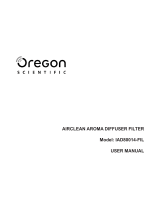4
YOUR SAFETY AND THAT OF OTHERS IS
HIGHLY IMPORTANT.
This manual and the appliance itself provide
important safety warnings, to be read and observed
at all times.
This is the attention symbol, pertaining to
safety, which alerts users to potential risks to
themselves and others.
All safety warnings are preceded by the attention
symbol and the following terms:
indicates a hazardous situation which, if not
avoided, will cause serious injury.
indicates a hazardous situation which, if not
avoided, could cause serious injury.
All safety warnings specify the potential
danger/warning to which they refer and indicate
how to reduce the risk of injury, damage and
electrical shock resulting from incorrect use of the
appliance. Comply with the following instructions:
• Installation or maintenance must be carried out by
a specialized technician, in compliance with the
manufacturer’s instructions and local safety
regulations.
Do not repair or replace any part of the appliance
unless specifically requested in the user manual.
• The appliance must be disconnected from the
power supply before carrying out any installation
work.
• Earthing of the appliance is compulsory. (Not
necessary for class II hoods identified by the
symbol on the specifications label).
• The power supply cable must be long enough to
permit connecting the appliance to the mains
socket outlet.
• Do not pull the power supply cable in order to
unplug the appliance.
• The electrical components must no longer be
accessible to the user after installation.
• Do not touch the appliance with any wet part of
the body and do not operate it when barefoot.
• This appliance may be used by children older
than 8 years of age and by persons with reduced
physical, sensory or mental capacities or with
inadequate experience and knowledge only if they
are supervised or if they have been taught how to
use the appliance in conditions of safety and if
they are aware of the dangers involved. Children
must not play with the appliance. Cleaning and
maintenance must not be carried out by children,
unless they are supervised by adults.
• Do not repair or replace any part of the appliance
unless specifically indicated in the manual.
Defective parts must be replaced using genuine
parts. All other maintenance services must be
carried out by a specialized technician.
• Children must be supervised to ensure they do not
play with the appliance.
• When drilling through a wall or the ceiling, pay
attention not to damage electric connections
and/or pipes.
• The ventilation ducts must always discharge to
the outside.
• Exhaust air must not be vented through a flue
used for removal of fumes produced by
appliances burning gas or other fuels, but must
have a separate outlet. All national regulations
governing extraction of fumes must be observed.
• If the hood is used together with other appliances
operating on gas or other fuels, the negative
pressure in the room must not exceed 4 Pa (4 x
10-5 bar).
For this reason, make sure the room is adequately
ventilated.
• The Manufacturer declines any liability for
improper use or incorrect setting of the controls.
• Regular cleaning and maintenance is essential to
correct functioning and good performance of the
appliance. Frequently clean all encrustations from
dirty surfaces to prevent the accumulation of
grease. Regularly clean or replace the filters.
• Failure to observe the instructions for cleaning the
hood and replacing the filters may result in a fire.
• The fume extractor hood must never be opened
without the grease filters installed and it should
be kept under constant supervision.
• Gas appliances must be used under the extractor
hood only with pans resting.
• When using more than three gas cooking points,
the hood should be operating at power level 2 or
greater. This will eliminate heat congestion in the
appliance.
• Before touching the bulbs, first ensure that they
are cold.
• Do not use or leave the hood without its lamps
correctly installed - risk of electric shock.
• Wear work gloves for all installation and
maintenance operations.
• The product is not suitable for outdoor use.
• When the hob is in use, accessible parts of the
hood may become hot.
• Never flame cook food (flambé) under the
appliance. Using free flames might cause fire.
• Do not leave frying pans unattended when frying,
as the frying oil may catch fire.
WARNING:
DANGER:
Important instructions for safety




















